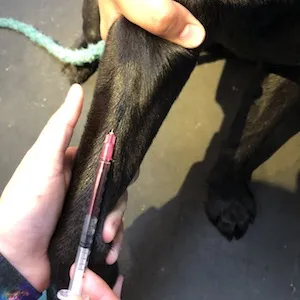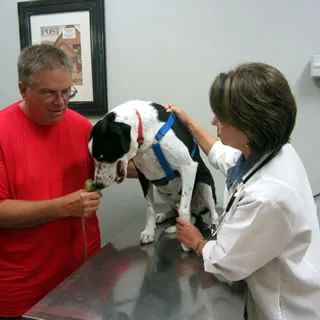Heartworm disease is a serious and potentially fatal condition affecting dogs globally. It’s caused by worms that reside in the heart, lungs, and blood vessels, leading to severe complications. Early detection is crucial for effective treatment and improving your dog’s chances of recovery. This article will cover the key signs and symptoms of heartworm disease in dogs, helping you stay vigilant and protect your furry friend.
Heartworm disease is caused by foot-long worms that infect the heart, lungs, and associated blood vessels, causing severe lung disease, heart failure, and damage to other organs in the body. Mosquitoes transmit the disease when they bite an infected animal and then pass the larvae to a new host.
Early Signs of Heartworm Disease in Dogs
In the early stages of heartworm infection, many dogs may not show any noticeable symptoms. This is why regular heartworm testing is so important. However, as the disease progresses, some subtle signs may start to appear.
- Mild, Persistent Cough: One of the first signs you might notice is a soft, dry cough that doesn’t seem to go away. This cough may be more noticeable after exercise.
- Reluctance to Exercise: Your dog may become less enthusiastic about physical activity and tire more easily than usual.
- Fatigue After Moderate Activity: Even after a short walk or playtime, your dog may seem unusually tired or out of breath.
Remember that heartworm medications are highly effective, but dogs can still become infected. If you’re concerned, learn more about[signs your dog is dying from heartworms](https://dogcarestory.com/signs-your-dog-is-dying-from-heartworms/).
Advanced Symptoms of Heartworm Disease in Dogs
As the heartworm infection worsens, the symptoms become more pronounced and can significantly impact your dog’s health.
- Decreased Appetite and Weight Loss: Your dog may lose interest in food, leading to a gradual decrease in appetite and subsequent weight loss.
- Difficulty Breathing: Labored breathing or shortness of breath can occur as the heartworms damage the lungs and heart.
- Swollen Abdomen: In advanced stages, fluid may accumulate in the abdomen, causing a noticeable swelling. This is a sign of heart failure.
 Dog Blood
Dog Blood
Caval Syndrome: A Life-Threatening Complication
In severe cases, a large number of heartworms can cause a sudden blockage of blood flow within the heart. This is known as caval syndrome, a life-threatening condition requiring immediate veterinary intervention.
- Sudden Onset of Labored Breathing: Difficulty breathing becomes severe and sudden.
- Pale Gums: The gums may appear pale due to reduced blood flow.
- Dark, Bloody, or Coffee-Colored Urine: This indicates kidney damage and the presence of blood in the urine.
Caval syndrome requires prompt surgical removal of the heartworm blockage to save the dog’s life.
Risk Factors for Heartworm Infection
While heartworm disease has been diagnosed in all 50 states, certain factors can increase your dog’s risk of infection.
- Geographic Location: Heartworm is more prevalent in areas with warmer climates and higher mosquito populations, such as the Atlantic and Gulf coasts.
- Outdoor Exposure: Dogs that spend a lot of time outdoors are at a higher risk of being bitten by infected mosquitoes.
- Lack of Preventative Medication: Failure to administer regular heartworm prevention medication significantly increases the risk of infection.
Remember, annual testing is necessary, even when dogs are on heartworm prevention year-round, to ensure that the prevention program is working. Learn more about[signs your dog is dying from heartworms](https://dogcarestory.com/signs-your-dog-is-dying-from-heartworms/).
Diagnosis and Treatment
If you suspect your dog may have heartworm disease, it’s crucial to consult your veterinarian immediately. They will perform a blood test to detect the presence of heartworm proteins.
Treatment for heartworm disease in dogs typically involves a series of injections to kill the adult worms. During treatment, exercise must be restricted to minimize the risk of complications.
 Dog in a Cage
Dog in a Cage
Prevention is Key
Preventing heartworm disease is much easier and more affordable than treating it. There are several effective heartworm preventatives available, including monthly chewable tablets, topical medications, and injectable options. Your veterinarian can help you choose the best preventative for your dog based on their lifestyle and risk factors.
- Year-Round Prevention: The American Heartworm Society recommends year-round heartworm prevention, even in colder climates.
- Annual Testing: Regular heartworm testing is essential, even if your dog is on preventative medication.
- Mosquito Control: Minimize mosquito exposure by keeping your dog indoors during peak mosquito hours and using mosquito repellent products approved for dogs.
What to Do If You Miss a Dose of Heartworm Prevention
If you miss a dose of your dog’s monthly heartworm prevention, contact your veterinarian immediately. They may recommend retesting your dog for heartworms six months after the missed dose.
 Dog Exam
Dog Exam
Conclusion
Heartworm disease is a serious threat to dogs, but with vigilance and proactive prevention, you can protect your furry friend. Be aware of the signs and symptoms of heartworm disease, maintain regular veterinary checkups, and administer heartworm preventative medication year-round. By taking these steps, you can ensure your dog lives a long, healthy, and happy life, free from the dangers of heartworm disease.
